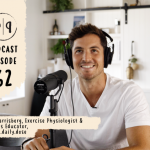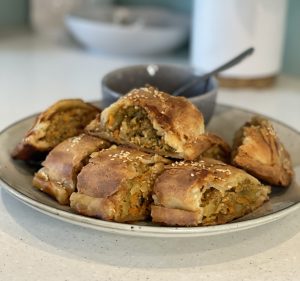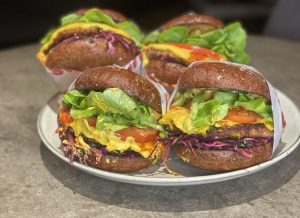
I decided to try out the keto diet to see what all the hype was about. People claim it is the ultimate fat-loss diet, others say it can reverse type 2 diabetes. I had to put it to the test to see if it would help me manage my type 1 diabetes.
The keto diet has sprung into popularity in recent times. In fact, it was the most googled diet term in 2021. People claim it is the ultimate fat-loss diet, others say it can reverse type 2 diabetes and cure an array of other health conditions. There is also a community of people living with type 1 diabetes who claim the keto diet is the best BGL management tool. Despite being positioned as a silver bullet, I was interested in what the science said about it and whether or not it would live up to the hype. So, I decided to put the keto diet to the test to see if it would help me manage my type 1 diabetes. After all, I’m a huge proponent of self-experimentation because it’s a great way to figure out if something works for you. My philosophy is, you can never have too many tools in your toolkit. Nutrition science clearly shows that there is inter-individual variability when it comes to certain dietary interventions but there’s no way to know the magnitude of effect unless you walk the walk.
Before I go on, I need to make something clear. I respect everyone trying to achieve optimal health. Whether you’re keto, low-fat or anything in between, the choice is yours. My only aim is to improve people’s lives. I feel a duty to share my experiences and highlight the scientific evidence out there supporting them because people need to be aware of the risks and benefits of any diet before getting into it. When I set out on my own personal dietary journey, I was not financially incentivised nor was I promoting anything. I have no hidden agendas. I simply want to find the healthiest way to live which will allow people to feel happy and fulfilled.
My Keto Experience
The thing that makes this experiment so eye-opening is, as someone living with type 1 diabetes I get to see objective insights every day into my blood glucose levels (BGLs) and insulin requirements. Unlike people with type 1 diabetes, non-diabetics who start a keto diet cannot measure daily insulin levels. The reason why this is so important will become clear as you keep reading.
After two months on a ketogenic diet, I was very lean, fit, had great focus and concentration, could go long hours without eating, had flatline BGLs, and achieved my lowest ever insulin requirements. At that point, it seemed like keto was indeed a silver bullet and I was a huge proponent of that way of eating. I raved about it on social media as I openly and transparently shared my journey in real-time. Fast forward another 2 months and everything took a turn for the worse.
I noticed that every time I ate foods containing even tiny amounts of carbohydrates, my BGL would spike. Sure, I was very efficient at burning dietary fat and endogenous ketones for energy but my tolerance for foods containing carbohydrates went down noticeably, even after exercise when I’m usually my most insulin sensitive and glucose tolerant. I also noticed that I needed more and more insulin to bring my BGL back down into the normal range. I was requiring a larger and larger mealtime insulin bolus for meals that contained almost no carbs at all. It would have been easy to demonise carbs as the culprit for the glucose spike, but that would have been a case of mistaken identity. Here’s why: Even if I didn’t eat anything and my own body produced glucose endogenously i.e the liver dumped glucose into my bloodstream via a process called gluconeogenesis, I couldn’t correct my high BGL because I was resistant to the insulin I was injecting. Another issue I was facing was that my fasting blood glucose was significantly elevated. My overnight BGL would continue to rise until the morning despite increasing my basal insulin dose. This is an indication that I was experiencing hepatic insulin resistance. In other words, my liver was not sensitive enough to insulin to get the message to stop its glucose output. It felt like I was on my way to developing type 2 diabetes/insulin resistance (type 1 is more than enough, thank you). It was a very frightening reality and a huge wake-up call. Furthermore, a blood test revealed that my cholesterol went up to 6.4 mmol/L.
The Keto Diet Does Not Always Reverse Type 2 Diabetes or Insulin Resistance
Just because a keto diet can lead to weight loss, very stable blood glucose levels, low insulin requirements, improved HbA1c, and in some cases patients can even come off their medication, that does NOT necessarily mean it reverses type 2 diabetes. It may seem like people have reversed their diabetes but really they’re just managing symptoms because as soon as they eat a carb-containing meal their blood sugar can spike again. The keto diet merely masks their silent glucose intolerance (and can even worsen it). It’s like someone with celiac disease removing gluten from their diet and seeing their symptoms disappear. Does that mean they cured their celiac disease? Of course not. They just removed the trigger of symptoms. As soon as they eat gluten again, their symptoms come back.
It is crucial to note, weight loss by any method can reduce insulin resistance and improve insulin sensitivity which may be why people get an initial benefit, however, it must also be noted that studies have shown high saturated fat intake in the absence of weight change can impair insulin sensitivity and worsen glucose tolerance.
The ketogenic diet is a short-term, Band-Aid solution (but a solution nonetheless) that minimizes blood glucose fluctuations but does not reverse the underlying condition of insulin resistance. In fact, evidence-based research shows that eating a low-carbohydrate diet can actually worsen insulin resistance. By almost completely removing carbs from the diet, you’re simply removing the trigger of symptoms (hyperglycemia) without addressing the root cause. Then when you reintroduce carbs your body can’t tolerate them which makes it seem like carbs are “bad” for you but really carbs are the victim of somebody else’s crime. After spending hours and hours down a rabbit hole of research, it turns out the real culprit is the very high levels of saturated fat found in meat, bacon, eggs, butter, coconut oil etc, which can lead to a buildup of ectopic fat inside the liver and muscle (called intrahepatic and intramyocellular lipids, respectively). When lipids accumulate in tissues where they don’t belong (ectopically) it can cause the cells to become dysfunctional, leading to insulin resistance and impaired glucose tolerance.
You may have heard people claim that ectopic fat is caused by sugar/carbs. Sure, the human body can convert excess glucose to fat, but the conversion of glucose to lipids via a process called ‘de novo lipogenesis’ happens to a very small degree, and those newly made lipids make up a very small percentage of intramyocellular lipids. This has been demonstrated experimentally using isotope-labelled glucose.
Furthermore, insulin has been wrongfully demonised as a ‘fat storage hormone’. Sure, one of the physiological properties of insulin is lipogenesis (fat storage) but when you minimize your intake of dietary fat, the impact is negligible. The reality is, insulin levels in the normal physiological range are required for survival. Insulin is not the enemy that many low-carbohydrate advocates claim by pointing to the heavily refuted carbohydrate-insulin model of obesity.
Insulin resistance is a silent condition. It can affect anyone and everyone, diabetic or not. It doesn’t discriminate. Most people don’t know they have it because they don’t need to monitor their blood sugar levels or inject insulin on a daily basis, but I do. As someone living with type 1 diabetes, I get objective insights every single day. I see first-hand the effects of different lifestyle variables on my insulin and blood sugar control. I’ve also spoken to dozens and dozens of clients living with type 1 who have had an almost identical keto experience to me. Sure, everyone is different so don’t just take my word for it. The science is out there (and has been for decades) that high-fat diets have been shown to induce insulin resistance and reduce glucose tolerance.
Low Carb Diets Work But…
To reiterate, there’s no denying that a low carb approach can lead to weight loss, stable blood glucose levels, reduced HbA1c, low total insulin requirements and overall improved diabetes management. In fact, I couldn’t agree more! I followed a low carb approach for 8 years with great results. I achieved a very larger reduction in total insulin requirements and very stable blood glucose control. But my point is, those biomarkers say nothing about one’s insulin sensitivity and carbohydrate tolerance. When you become primarily fat-adapted on a keto diet, you lose metabolic flexibility and can’t tolerate even small amounts of carbs. To me, that doesn’t sound optimal when some of the healthiest foods known to humans are avoided on a keto diet. Some say the mechanism of glucose intolerance is insulin resistance, others say it’s enzymatic but regardless of the mechanisms, one thing we all agree on is that carbohydrate tolerance goes down. Even world-leading keto experts admit that the keto diet induces a state of temporary glucose intolerance as seen by the results from oral glucose tolerance tests (OGTT).
I don’t have a problem with the physiological state of ketosis (unless you’re living in that state long term). You can achieve ketosis by fasting or even doing a plant-predominant keto diet. Intermittently, the state of ketosis can be healthy but how you achieve it is a very important part of the quest. I have concerns with the fashionable, new-age, fibre-deficient keto diet because it glorifies saturated fat and promotes a high intake of bacon, processed meat, refined oil, eggs, butter and coconut oil. I don’t agree that those foods should make the bulk of your daily calories especially when they’re replacing known healthy foods like fibre-rich, nutrient-dense, and antioxidant-rich fruit, vegetables, whole grains and legumes. Furthermore, the science is clear that replacing saturated fat with unsaturated fat improves insulin sensitivity making diabetes management more effective in which case I can see how a healthier keto diet can be constructed if unsaturated fats (avocado, olive oil, nuts and seeds) and fibre (from non-starchy vegetables, cruciferous vegetables, leafy greens and legumes) are prioritised.
Another Solution
Having made the connection between poor health outcomes and saturated fats, I knew I had to make a change. So, I decided to embark on a journey to see if removing those foods altogether and eating more plant-based foods would reverse the metabolic damage I had caused. I immediately embarked on a strictly whole-food plant-based journey under the guidance of world-leading plant-based diabetes experts.
I dropped my fat intake from ketogenic levels (75% of my daily energy intake) to the other end of the spectrum ~10-15% of TEE. I removed all animal foods and oils from my diet. I focused on eating healthy fats from avocados, nuts, and seeds. I also added whole grains and legumes back into my diet (both of which I hadn’t eaten in nearly seven years since following a paleo approach) and an abundance of all types of fruits and vegetables. Within 48 hours my insulin sensitivity started to return to normal. Within 1-2 weeks my carbohydrate intake was the highest it had been since being diagnosed with diabetes, and my insulin requirements dropped dramatically.
I’ve been strictly plant-based for over 3 years and the results have been astonishing. I’ve achieved my best ever insulin-to-carb ratio, and it feels like I’m in full control of my health. My average BGL, HbaA1c, mean standard deviation and time in range (TIR) rival those of non-diabetics. Some days my TIR is 100% but is over 90% for the vast majority of the time.
What started as a plant-based journey toward personal development and health has turned into something so much bigger. The positive impact I’m having on myself, the people around me, environmental sustainability, and animal welfare give me so much fulfilment and joy. I cannot wait to see where this journey takes me over the long term.
The Takeaway Message
It is evident that there are two polarising approaches on opposite ends of the spectrum, both of which have their proponents, but the real problem lies in the middle – the standard western diet. The standard western diet which is high in refined carbs, fats, protein and calories (mostly from processed foods), coupled with a sedentary lifestyle is the real reason we are facing an epidemic of insulin resistance and type 2 diabetes. Any deviation away from the middle towards a real-food approach will result in improved health outcomes. I’ve experienced this on both ends of the spectrum.
The ketogenic diet does not necessarily cure type 2 diabetes but rather it manages the symptoms. Normal insulin and blood glucose levels in the absence of carbs is not an indication of reversing type 2 diabetes. Rather, normal insulin and blood glucose levels in the presence of carbs is a true indication of improved insulin sensitivity and glucose tolerance, and in some cases can put type 2 diabetes into remission.
If you can stick to a keto diet for your entire life and it helps you to manage your diabetes symptoms and ultimately avoid the tragic long-term complications of diabetes then I’m all for it. Good for you. But for most people it is unsustainable in the long term, it may increase your risk of developing other chronic diseases (by the addition of unhealthy fats and the exclusion of healthy fibre-rich foods), and may worsen your carbohydrate tolerance.
The good news is, there’s another way! You can successfully manage type 2 diabetes and reverse insulin resistance by adopting a whole-food plant-based dietary pattern with a focus on low total fat intake, particularly saturated fat, and focusing on mono/polyunsaturated fat sources. People are achieving non-diabetic HbA1c results, stable blood glucose levels, normal insulin levels, and reducing their need for certain medications while eating an abundance of unrefined, healthy, whole-food carbohydrates. In my eyes, that is the true sign of insulin sensitivity and metabolic health.
References:
https://www.ncbi.nlm.nih.gov/pubmed/10027589
https://www.ncbi.nlm.nih.gov/pmc/articles/PMC507380/
https://www.ncbi.nlm.nih.gov/pmc/articles/PMC3294420/
https://www.omicsonline.org/mechanisms-of-fatty-acid-induced-insulin-resistance-in-muscle-and-liver-2155-6156.1000127.php?aid=715
https://www.ncbi.nlm.nih.gov/pubmed/23122836
https://www.ncbi.nlm.nih.gov/pubmed/10480616
https://www.ncbi.nlm.nih.gov/pubmed/30089335
https://www.ncbi.nlm.nih.gov/pmc/articles/PMC1561276/
https://www.nejm.org/doi/full/10.1056/NEJM197103112841004
https://academic.oup.com/ajcn/article/74/6/707/4737384
http://diabetes.diabetesjournals.org/content/58/12/2741
https://www.ncbi.nlm.nih.gov/pubmed/27479196
https://www.ncbi.nlm.nih.gov/pubmed/29425120
https://www.ncbi.nlm.nih.gov/pmc/articles/PMC2989112/








2 Comments
Drew;
Thank you so much for this article. I too have experienced this Keto nightmare and the physiologic insulin resistance. The smallest dosage of carbs put me in a super blood sugar high and I could not do a thing about it other then drink water. Exercise causes the liver to dump more sugar and the nightmare continues. Initially Keto gave lower sugar numbers but slowly I was finding out that the numbers were creeping up and no amount of exercise would bring them down. Before Keto I would do cardio and be able to bring the numbers down by several points with in 45 min.
With my dad passing the numbers have gone in the wrong direction and have not come down. With all the nasty side effects of the drugs, I am trying not to do them. I started getting off Keto about 3 weeks ago and have been increasing carbs slowly as the sugar numbers with the increase in carbs are really scary.
This article has given me hope that I am on the right track and so I have to thank you for publishing it.
Thank you so much for this article. I experienced everything you’ve mentioned after doing meat heavy keto for one year. While I do not have Type 1 diabetes, I believed I was insulin resistant prior to starting keto. I gave up my 7-years-long vegan diet for this new way of eating and now instead of better health and weight loss (I never experienced weight loss while on keto just mild body recomposition) I feel like I may have developed Type2 diabetes. Whenever I eat healthy carbs, I have many signs of glucose dysregulation including blood sugar headaches and racing heart. This never happened before. I am very interested in figuring out how to return to a healthy vegan lifestyle but can’t seem to reverse the glucose intolerance I’ve caused. Now, healthy carbs in any excess cause what I’m sure are blood sugar spikes (think large salad or salmon and non-starchy veg like cabbage with one spoonful of brown rice). I’ve just ordered a CGM in the quest to get back to better health and I am hopeful it will help me confirm what is going on, but I’d love it if you could share more about how exactly you reintroduced healthy carbs, on what schedule, and how you felt along the way. I am now convinced that I was never insulin resistant before keto but certainly am now.